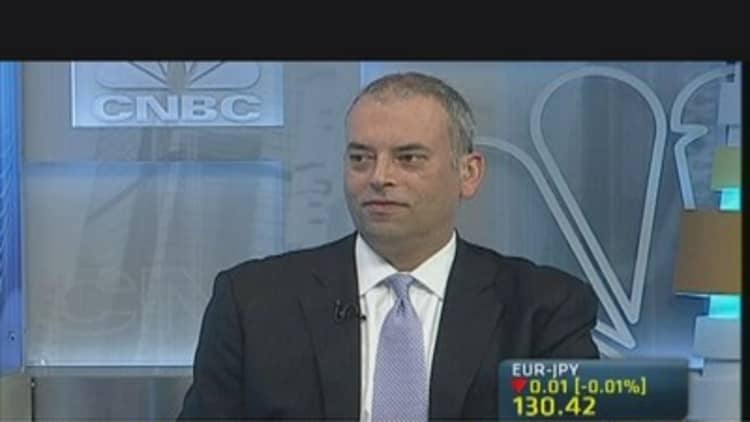China is to further internationalize its currency by allowing Singapore-based investors to buy renminbi-denominated securities, paving the way for direct trading between the two countries' currencies.
The accord follows last week's announcement from George Osborne, Britain's chancellor – or finance minister – who touted a similar agreement as a breakthrough for London as a global hub for renminbi trading.
(Read more: China's yuan flexes muscle as US crisis rattles on)
The deals highlight how China has been carefully handling the granting of trading privileges to financial centers jostling to win status as offshore renminbi hubs as use of the Chinese currency outside the country grows.

In the latest agreement, China will extend its so-called renminbi qualified foreign institutional investors (RFQII) program to Singapore, allowing Singapore-based banks and asset managers a quota of Rmb 50 billion ($8.2 billion) to invest in Chinese securities, the Monetary Authority of Singapore said.
Under a similar arrangement struck last week with Britain, that quota was set at Rmb 80 biliion for financial institutions based in that country. Hong Kong is the only territory with an existing RFQII arrangement.
Under RQFII, those holding renminbi offshore are able to invest directly in mainland Chinese assets – from stocks to bonds to money market funds. By widening the investment options for renminbi sitting outside China, the system is partly designed to encourage the use of the currency for trade settlement.
It also helps to increase foreign participation in China's domestic markets, something the authorities have been keen to do in an attempt to attract more long-term investment.
(Read more: China central bank underlines reform push with record yuan)
For Singapore, a tiny island nation of only 5.3 million people, the agreement with China marks another significant step in building itself up as the renminbi hub for southeast Asia.
One of China's biggest state-owned banks, Industrial & Commercial Bank of China, in May started clearing services for renminbi transactions in Singapore.
In September, Singapore overtook Japan as Asia's biggest foreign exchange center for the first time, making it the third-largest such hub in the world after London and New York.
More from the Financial Times:
Access to markets signals Beijing's resolve
Singapore swipe at Clifford Chance
Renminbi hits record high against dollar
Currency strategists say that Singapore is not likely to rival Hong Kong as an offshore renminbi center, and is seen as a future renminbi hub for business done in the Chinese currency across the Association of Southeast Asian Nations.
"Singapore is a significant foreign exchange hub, meaning the market structure is already in place, and its position as a regional manufacturing and trading centre will ensure there is real and growing demand around renminbi," said Loh Boon Chye, deputy president for Asia Pacific at Bank of America Merrill Lynch in Singapore.
However, use of the currency for trade settlement generally has failed to keep pace with trading.
(Read more: As China's foreign reserves surge, are currency wars back?)
While the renminbi was the eighth most popular trading currency in August this year – the most recent month for which figures are available – it was only the 12th most used payments currency, according to Swift, the payments system.
The MAS said Singapore would also be "given consideration" as one of the investment destinations under a separate "renminbi qualified domestic institutional investor" scheme. This would allow Chinese investors to use the renminbi to invest in Singapore's capital markets.
In addition SGX, the Singapore exchange, and the Shanghai Futures Exchange signed an initial agreement to jointly develop commodity derivatives.

